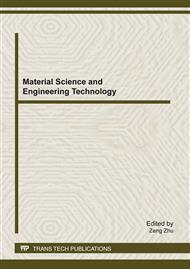[1]
Sflva Guillermo J, Datta Anfruddha, Bhattacharyya S P. Newresults on the synthesis of PID controllers [J]. IEEE Transactions on Auto-matic Control, 2002, 47(2): 241-252.
Google Scholar
[2]
FENG Xiao-bing, WANG Wei. MATERIALS AND PROCESS RESEARCH OF 2 MEGAWATT WIND TURBINE BLADE[J]. Fiber Reinforced Plastics/Composites, 2010, 4: 84-88.
Google Scholar
[3]
Bamieh Bassam, Pagannini Fernando, Dahleh Munther A. Distributed control of spatially Invariant systems [J]. IEEE Transactions on Automatic Control, 2002, 47(7): 1091-1107.
DOI: 10.1109/tac.2002.800646
Google Scholar
[4]
M Zhuang, D P Atherton. Automatic tuning of optimum PID controllers [J]. IEE PROCEEDINGS-D, 1993, 140(3): 216-224.
DOI: 10.1049/ip-d.1993.0030
Google Scholar
[5]
C C Hang, K J Astrom, W K Ho. Refinements of the Ziegler-Nichols tuning formula[J]. IEE Proceeding-D, 1991, 138(2): 111 -118.
DOI: 10.1049/ip-d.1991.0015
Google Scholar
[6]
Lee Jin Woo, Lee, Young Jin, Lee Kwon Soon. Anti-sway control of an ATC using NN predictive PID control[C]/IECON Proceedings(Industrial Electronics Conference), IECON 2004-30th Annual Conference of IEEE Industrial Electronics Society, 2004: 2998-3003.
DOI: 10.1109/iecon.2004.1432289
Google Scholar
[7]
MA Xiang, WANG Shao-bo. Design of a kind of intelligent self-adjusting PID control system and application of stairstep singal [J]. Journal of Fuzhou University(Natural Science) , 2003, 31(4) 430-432.
Google Scholar
[8]
Li Han-Xiong, Zhang Lei, Cai, Kai-Yuan, et al. An improved robust fuzzy-PID controller with optimal fuzzy reasoning[J]. IEEE Transactions on Systems, Man, and Cybernetics, Part B: Cybernetics, 2005, 35(6): 1283-1294.
DOI: 10.1109/tsmcb.2005.851538
Google Scholar
[9]
Herrero J M, Blasco X, Martinez M, et al . Optimal PID tuning with gentic algorithms for non-linear process models[C]/IFAC 15th Triennial World Congress, Barcelona, Spain, (2002).
DOI: 10.3182/20020721-6-es-1901.00658
Google Scholar
[10]
HAN HUA, LUO An, YANG Yong , A nonlinear PID controller based on genetic tuning algorithm [J] . Control and Decision, 2005, 20(4): 448-454.
Google Scholar
[11]
Dorigo M, Maniezzo V, Colorni A. The ant system: Optimization by a colony of cooperating agents[J]. IEEE Transaction on Systems, 1996, 26(1): 1-26.
DOI: 10.1109/3477.484436
Google Scholar
[12]
Dorigo M, Grmbardella L M. Ant colony system: a cooperative learning approach to the traveling salesman problem[J]. IEEE Transaction on Evolutionary Computation, 1997, 1(1): 53-66.
DOI: 10.1109/4235.585892
Google Scholar
[13]
Corlorni A, Dorigo M, Maniezzo V, et al. Ant system for job-shop scheduling[J]. Belgian J Oper Res Statist Comput Sci, 1994, 34(1): 34-53.
Google Scholar


